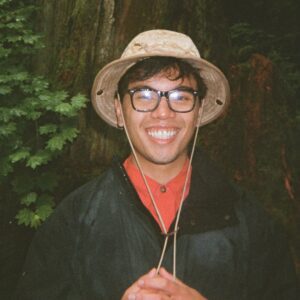About Christopher Cheung
I’m a Vancouver journalist who got my start in 2014 writing for local publications like the Vancouver Courier (some of you might remember my profile on the legendary Duffin’s Donuts) and Metro. To show you how fast things change in our industry, both of these no longer exist. Since 2018, I’ve been a staff reporter for the past four years at The Tyee, an online magazine that covers news and culture in B.C. My beat is urban issues, which is a stew of everything from housing, immigration, inequality, food, politics, and how neighbourhoods change.
One day I might be writing about how a new tower is about to displace Collingwood Village’s Filipino businesses; another day I might be writing a history on why governments have given up providing public washrooms; and the next visiting a Surrey warehouse turned to 27 Celcius to keep its mangoes at the perfect temperature. In 2021, I won the first Webster award for diversity and inclusion for my pandemic reporting that merged personal stories with census data to show how people of colour were hit hardest by COVID-19. I graduated with a master of journalism from the University of British Columbia, which taught me to ground everything I do in scholarly research, and often visit post-secondary institutions to talk about my work.
What has been the biggest challenge you have had to overcome?
From my first day on the job, I was lucky enough to have been surrounded by generous journalists. They shared with me just about everything to do with the practice of journalism: literary techniques to hook readers, tips for conducting effective interviews, and how to find unique stories outside of press releases. But there was one kind of expertise that I didn’t receive: how to report on racialized groups and other underrepresented communities.
There simply weren’t any mentors around to help me with this, which is surprising considering how something like race intersects with just about every key newsroom beat like health, labour, politics. Without any direction, there were times that I “whitewashed” my work without knowing, exoticizing cultures and recycling well-worn tropes like the model minority. It’s only over time that I’ve picked up lessons on how to do so with more sensitivity and authenticity.
If you were not in journalism and media – what industry would you work in?
Probably graphic design. You can see my work once in a while on The Tyee site, from event posters to story art. One highlight was a series of collages I made of every plastic bag under my sink after Vancouver banned them.
What has been a highlight of your career?
Any day that someone tells me a story of mine enlightened and entertained them in some way!
What motivates you in your work? Spending time with people who make the city tick, whether it’s janitors, donut makers, grocery tycoons, or grandparents who babysit. Profiling important places that don’t often get media attention, usually immigrant and/or low-income neighbourhoods. Explaining inequalities in simple language so that audiences learn to see the ways our society isn’t working and what needs to be fixed. In short, doing journalism that helps people get to know their neighbours and the communities they live in intimately.
What are 2 tips you want to pass along to PR professionals that send you pitches?
One: Check out a journalist’s area of coverage before sending a pitch. I’ve received so many pitches for topics that I’ve never covered before, like axe-throwing and Christmas gift guides. Our culture editor recently received a pitch from the U.S. about gun ammo. It only takes a few minutes to look up the right journalist and learn enough about them to tailor the pitch.
Two: Ask yourself if the pitch is really in the public interest. The average person doesn’t care whether a company donated to some cause or whether someone they haven’t heard of has joined the board of directors for a body they’ve never heard of.
What is one piece of advice you’d give someone that wants to pursue a career like yours?
Make the job work for you! Journalism is an incredible excuse of a profession to satisfy your personal curiosity. Use it to meet people you’ve always wanted to meet, go behind-the-scenes of places you’ve always wanted to go, answer questions you’ve always wanted answered. The best stories come from curiosity, and it shows. These stories will help you develop an expertise and a reputation, and set you apart from the pack.
What are your predictions for the future of the media industry?
I wish I knew! But here’s some of what’s been happening already. Legacy outlets that have been slow to prioritize their online platforms will be playing catch-up; our local daily only just launched an e-mail newsletter last year. Community papers that have been dependent on print advertising, which is ever drying up, will continue to reduce editions, go online-only, lay off staff, or either merge with the newsroom of another nearby community or be sold. I think we’ll see more online start-ups, especially those that cater to a specific or underserved audience, like a topic people are passionate about or a geographic community. But without stable and consistent revenue sources, they’ll have a hard time.
At The Tyee, for example, we see our future based on direct financial contributions from readers. It’s proven to be a good model for us so far and made us less dependent on advertising, which is increasingly shifting to social media platforms. Because of this tumultuous landscape, journalism schools are teaching their students to be jacks-of-all-trades. Bell these days calls its reporters “Multi-skilled Journalists.” It’s not usual to find a posting with language like “thrive under pressure in a fast-paced multimedia news environment.” I’m especially sad for photojournalists, as staff positions in newsrooms are one of the first to go. All in all, a lot of competition but also exciting evolution and innovation.
Categories:
Ask the Expert
Tags:
Chris Cheung, The Tyee



